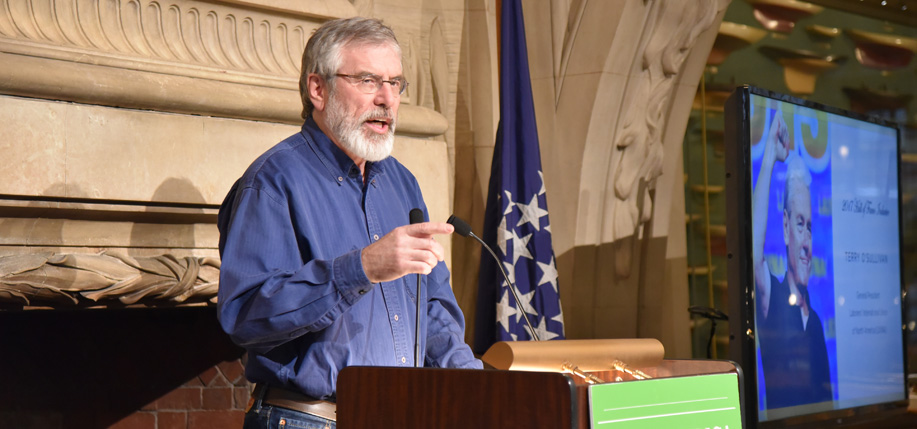Gerry Adams, president of Sinn Féin and one of the most formidable figures in Irish nationalist politics for nearly 50 years, announced at the Sinn Féin party conference in November that he plans to retire in 2018, ceding control of the party he has led for 34 years, and making way for a new generation of Irish republicans to come to the fore.
“Leadership means knowing when it is time for change,” he said during a heartfelt speech at the convention in front of a 2,500-person crowd. “That time is now.”
Currently, Sinn Féin is the third-largest party in the Republic of Ireland, and the second-largest in Northern Ireland, and its new president could be poised to make the party’s image even more legitimate and palatable to many who still view it as suspicious, even, possibly, entering government in Dublin for the first time. Speaking to the New York Times, University College Dublin politics professor David Farrell said, “Under a new Sinn Féin leader I think anything is possible.” ♦
Gerry Adams Announces Retirement


One of the reasons why Adams and his Sinn Féin Party continue to make gains on both sides of the artificial Partition is because all the other political parties are quite comfortable with the British-imposed Border. Seo rcúis eile: is Gaeigeoir Adams agus gach Sinn Féin polaiteoir eile.
Gerry Adams/ name is synonymous with the 30 years Troubles in the North of Ireland, During that long conflict, we know of only one man who received the death sentence, Liam Holden, who when tortured admitted to the murder of British soldier Frank Bell. The torturing of the 19-year-old Nationalist included waterboarding. He was the last man to be sentenced to hang in Ireland or Britain, but his was commuted because the death penalty had then been abolished in G.B. However, Liam Holden would spend 17 years in prison before being released in 1990. But his wrongful conviction was not quashed until June of 2012.
The conflict that lasted for about 30 years in the North was usually described in the media as “religious warfare”. Very few seem to know that one of the most uncompromising, militant Provo leaders was Ivor Bell, a Protestant. Born in 1837, Bell shared a cell in Long Kesh with Brendan Hughes and Gerry Adams, and in 1982 he succeeded Martin McGuinness as the Provos’ Chief-of-Staff. In 1986, Bell strongly opposed Adams willingness to make peace with the Brits and was court martialed for this.